O PSL-PI tem por objetivo incentivar o uso e a produção de software livre no Piauí como política de combate à exclusão digital. Acreditamos que a distribuição de conhecimentos proporcionada pelo Open Source/Software Livre tornará nossa sociedade mais justa e próspera, exatamente por dar a todos as mesmas condições de conhecimento e desenvolvimento.
Software Livre é uma grande oportunidade de construirmos uma sociedade produtora de ciência, independente e efetivamente competitiva. Estamos reconstruindo as bases da nossa sociedade, não mais calcados nos braços do Estado, mas sim, amparados pela iniciativa própria, pela auto-determinação. Nós somos capazes de nos auto-governar. Somos capazes de construir uma sociedade efetivamente Livre. Esta é a essência do PSL-PI.
O PSL-PI é formado pela articulação de indivíduos que atuam em instituições publicas e privadas, grupos de usuários e desenvolvedores de software livre, empresas, governos ou ONGs, e demais setores da sociedade. O importante é a consciência e disposição para propagar o uso de software livre e a cultura colaborativa nas diferentes esferas da sociedade.
Filipe Saraiva: KDE at FISL 13
9 de Setembro de 2012, 0:00 - sem comentários ainda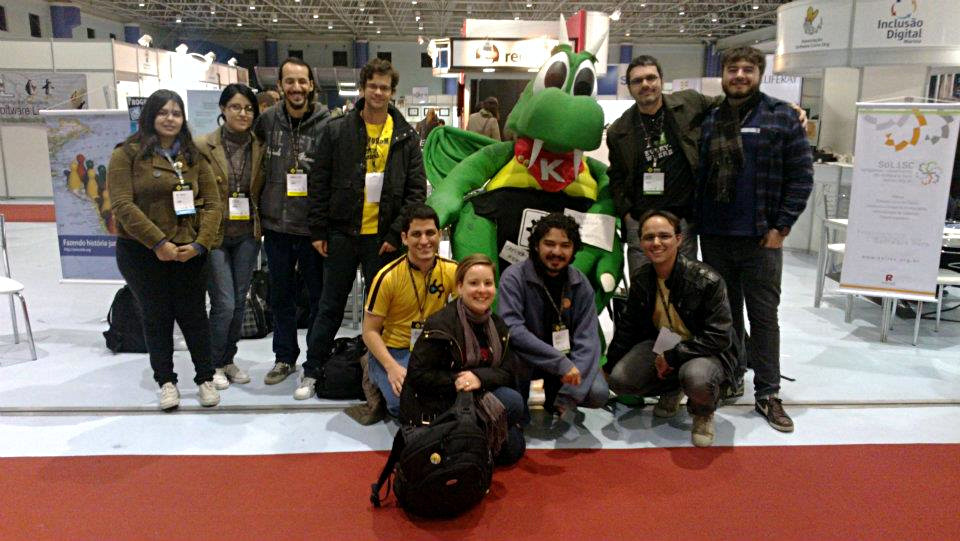
Some KDE Brazil people at FISL 13
The 13th International Free Software Forum (FISL 13) – in portuguese, Fórum Internacional de Software Livre - happened almost a month ago, but only now I found the time to report the KDE community participation at the event.
FISL 13 is the biggest event related to free software and free culture in Brazil. Certainly, it is one of the biggest events of its kind in the world. Thousands of participants (7709!), hundreds of lectures (584!), community events, workshops, community booths, speeches, and in the corridors have several developers, designers, hackers, and digital culture activists.
The KDE community was present with an interesting programming. We set up a booth that drew much attention and stood out in the area targeting users/developers groups. I am preparing a special blogpost just on our stand. ![]()
We had KDE souvenirs like T-shirts, stickers, and pins at our table, with special emphasis on brooches with Brazilian regional representations of Konqi. A banner commemorating the KDE 15th anniversary identified among the other groups. We also had some notebooks with KDE to people observe and experience our software.
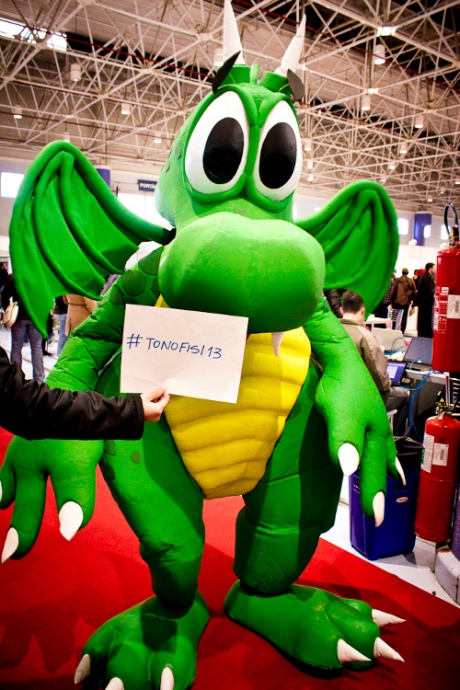
But what really drew attention was the Konqi fantasy commissioned by Tomaz. It is huge, and Konqi was very funny, with a charismatic and good-natured face. Wear it is extreme very hard, two people are required to assist the “pilot” to put the armor. Inside is very hot, almost impossible to see, and the moves are complicated to implement. But it is fun to see a huge green dragon dancing and walking the halls.
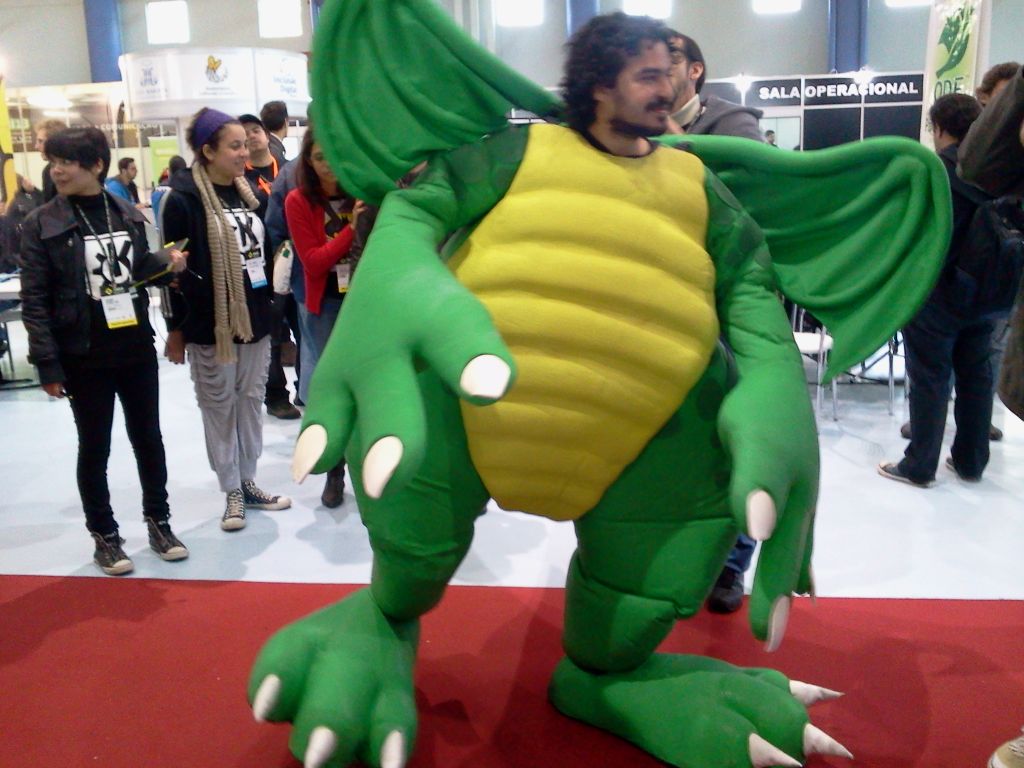
I could not resist =D
The main Konqi pilot was Tomaz, but many people took turns on the task of giving life to our mascot, like Wagner, me and another couple of people who out of nothing appeared asking if they could be for some time a big, charismatic, and bighead green dragon. = D
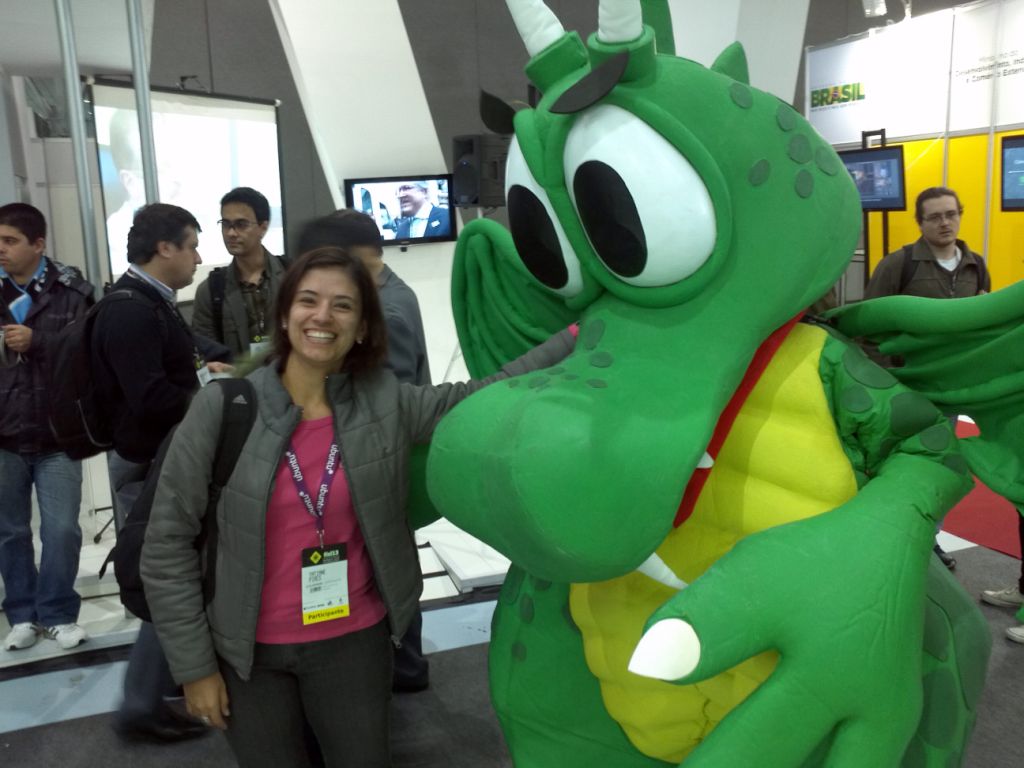
@tatianepires is happy because Konqi is at FISL
When he was not walking and dancing around, Konqi was assembled in our booth, sitting in two chairs. Several people took pictures with him, keeping a reminder of KDE. Our stand also became a focal point of children that were looking admired for our dragon. They came out of there with chocolate and blue and white balloons.
We were on the event schedule with an extensive program of lectures and courses, plus “special guests” especially in activities of free software and education groups.
Some of our highlights this area were the lecture and workshop of Sebastian Kügler, or Sebas for friends ![]() We are very happy that he has accepted the invitation to come to Brazil to attend the event, and we hope he has enjoyed their stay here.
We are very happy that he has accepted the invitation to come to Brazil to attend the event, and we hope he has enjoyed their stay here. ![]()
Sebas, together with Daker, held a workshop on developing applications to multidevice using Plasma KD technology. Two days later, it was time to present the Plasma Active, KDE for tablets, and talk about the platform, such as KDE is considering the future of free software in the mobile computing scenario, and what the future of KDE on these devices.
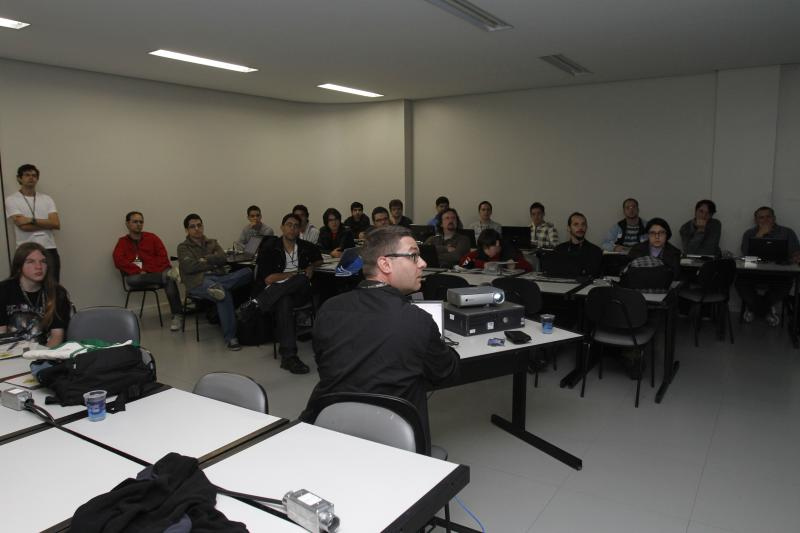
Sebas’s course. Image by Olga Produções
We had a relax moment where we organized a pre-KDE 4.9 Release Party in a bar at the city (the Penguin’s Bar = D) where we could drink some and relax a bit.
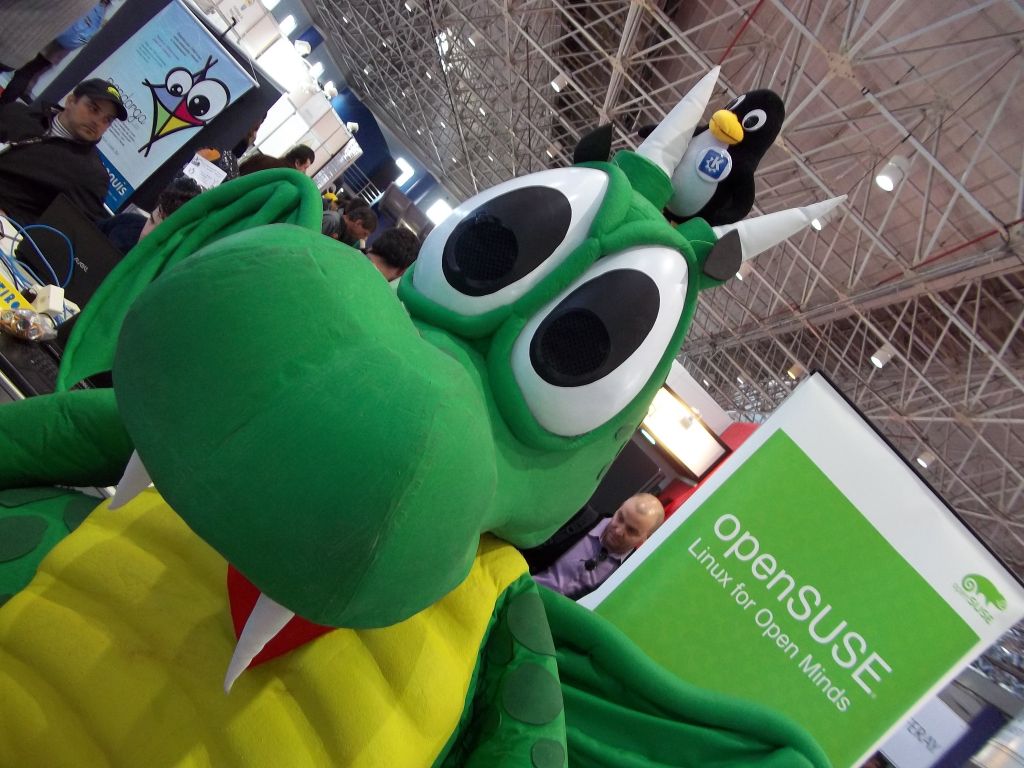
Izabel cracked our photo with OpenSUSE banner!
One last word about the FISL, a girl who had never used Krita was our stand and simply made wonderful drawings with the software. It seemed that she had complete familiarity with the tool! A KDE guy recorded a screencast of her preparing a “D&D version” of Konqi adult. By the way, where is the video? Well, the final design is below:
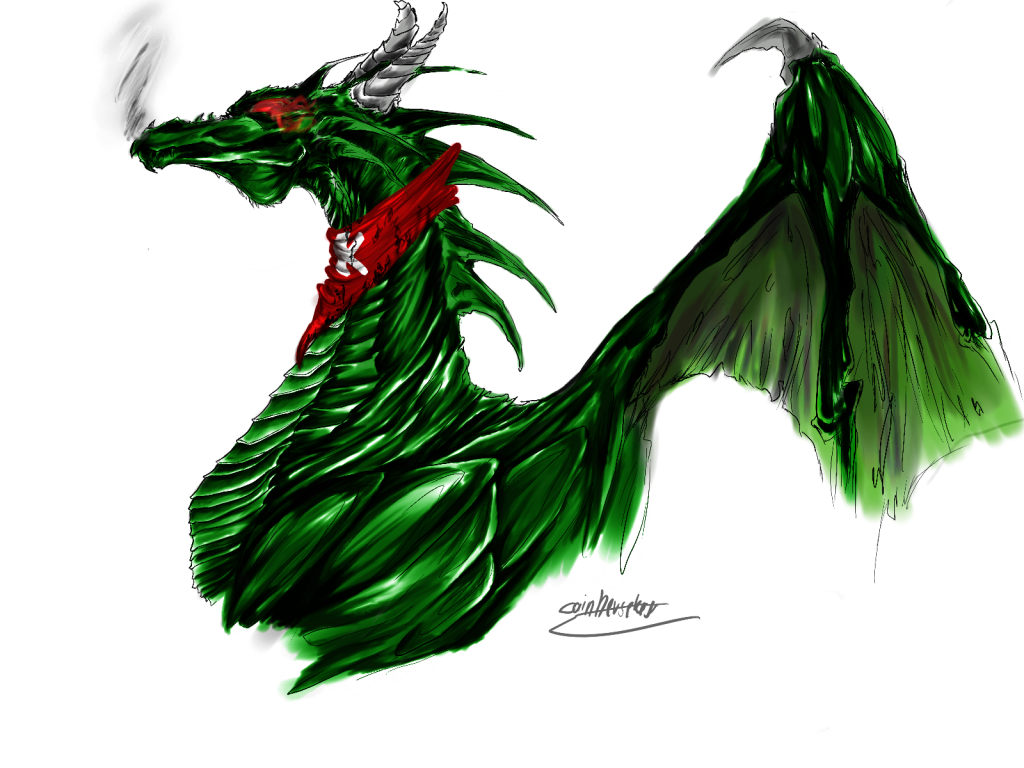 Well, I can only say that this FISL 13 was very good for KDE Brazil. We give more visibility to the project, we set up a booth really cool, presents an excellent programming to the event and we rely on the presence of our friend Sebas. Again, I would like to thank Sebastian for having accepted our invitation to visit the Brazilian lands. Also thanks to ASL, Paulo Meirelles, and Rodrigo Troian, who did everything necessary to make possible the coming of Sebas. Thanks guys!
Well, I can only say that this FISL 13 was very good for KDE Brazil. We give more visibility to the project, we set up a booth really cool, presents an excellent programming to the event and we rely on the presence of our friend Sebas. Again, I would like to thank Sebastian for having accepted our invitation to visit the Brazilian lands. Also thanks to ASL, Paulo Meirelles, and Rodrigo Troian, who did everything necessary to make possible the coming of Sebas. Thanks guys!
We’re trying to create a new kind of relationship with the FISL, and the goal is to have, in all editions of the event, an international speaker invited to present news about KDE project.
We’re awaiting the FISL 14, and hope to see you all there!
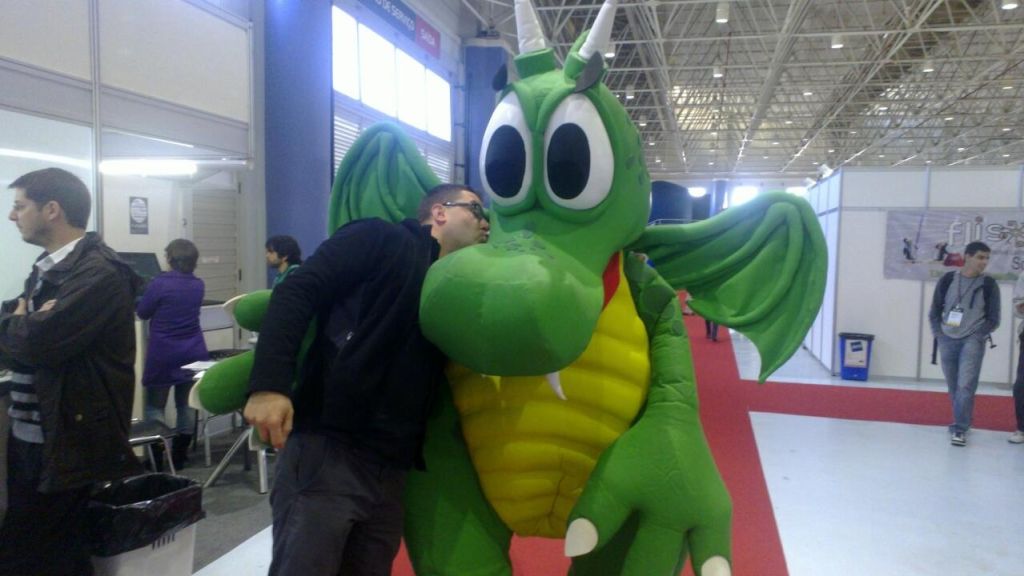

Filipe Saraiva: Scilab para Engenharias
9 de Setembro de 2012, 0:00 - sem comentários aindaDurante o IV Encontro de Software Livre da UNESP Ilha Solteira, tive oportunidade de apresentar duas palestras voltadas para o uso de software livre na academia e, em especial, nos cursos de engenharias e ciências exatas em geral.
Uma delas foi uma nova versão da Preparando o GNU/Linux para a Academia, já apresentada no IV Encontro Nordestino de Software Livre. A outra, essa inédita, foi a apresentação do Scilab, com algumas aplicações e suas potencialidades, e como esta ferramenta livre pode ser um substituto de fato para o conhecido Matlab.
Eu uso Scilab desde a graduação. Durante disciplinas no meu mestrado e doutorado, continuei usando-o sem quaisquer dificuldades. Foi até interessante, nas pós-graduações que fiz em engenharia elétrica meus colegas só usavam Matlab e eu, lado-a-lado com eles, fazia as mesmas coisas no Scilab. Eles puderam ver que a ferramenta é, de fato, eficaz.
Também me envolvi com o Scilab durante o Google Summer of Code 2011, quando trabalhei orientado pelo Sylvestre Ledru, e fiz um backend para o software matemático do KDE, o Cantor.
A apresentação em si é de nível introdutório, para quem nunca ouviu falar da ferramenta. Uma pena que grande parte do que apresentei foi a partir de demonstrações. Estou aguardando a disponibilização dos vídeos do encontro, e assim que as tiver colocarei por aqui.
Lucas M.A.C.: Software Freedom Day – 2012
9 de Setembro de 2012, 0:00 - sem comentários aindaAhhhh! E a inscrição é GRATUITA, ok? =D


